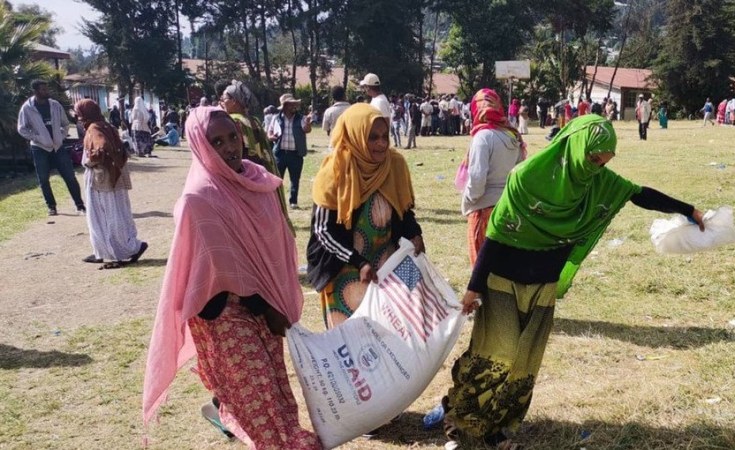Doha, Qatar — Liberia's Foreign Minister Dee Maxwell Kemayah says crippling financial challenges remain an impediment for the world's Least Developed Countries (LDCs) in the implementation of their national development agenda.
Forty-six low income countries including Liberia are grouped as LDCs due to their poor economic status and low levels of human assets.
Speaking as head of the Liberian delegation at the LDCs' Leaders Summit ahead of the Fifth United Nations Conference on Least Developed Countries (LDC5) in Doha, Qatar on Saturday, Minister Kemayah called on rich countries and development partners to assist LDCs in mobilizing resources to boost their economies and attract investment, a key priority area of the Doha Programs of Action (DPOA).
"Mobilizing financial resources for development remains a challenge for most LDCs; and without doubt, this challenge also impacts LDCs' ability to implement their national development plans, agendas; as well as the potential to derail the Doha Program of Action implementation," Kemayah said.
Strengthening the complimentary role of South-South cooperation is also vital. We must encourage increased cooperation between and amongst southern countries and partners from developing countries to undertake projects, and invest in key priority areas, including building productive capacities of LDCs, which is essential for achieving sustainable growth, structural transformation, and creation of employment and decent jobs.
The DPOA is a ten-year commitment for renewed and strengthened partnerships between LDCs and developed nations, as well as the private sector and civil society. The proposal calls for investing in people, eradicating poverty, promoting education and health; as well as tackling climate change and COVID-19. It also calls for structural reforms and international partnership to support LDC members for sustainable graduation.
Liberia, once engulfed in a 14-year civil war is referred to as the United Nations' post conflict success story. However, it is still grappling with immense challenges, ranging from high unemployment rate, limited basic infrastructure to challenged health and education systems.
PAPD Encapsulates DPOA
In his address, Kemayah said the Liberian Government's national development agenda, the Pro-Poor Agenda for Prosperity and Development (PAPD) captures the priority areas of the DPOA.
On investing in people, especially the physically challenged, children, youth, women and the elderly, and building capacity to leave no one behind, Kemayah noted that the Liberian Government is supporting critical sectors such as health, education, agriculture, and infrastructure for more transformative results.
In addition, he noted the Government has initiated a number of programs to promote youth capacity building, through the National Youth Literacy Program, Youth on-the-Job Training program; temporary employment for community youth; and women empowerment project, as well as addressing social norms, inequalities and gender-based violence. These social safety net projects provide income support to poor households, he said.
On infrastructure development, he noted that the government, with support from its development partners including the World Bank and African Development Bank is intensifying its road construction projects. Under the project, he said 436 kilometers of new primary road has been constructed under the George Weah-administration, increasing the total paved road to 1,375 kilometers. The administration had inherited just 745km of pave road, less than 5 percent of the country's road network, he said.
The Minister also told the LDCs' leaders that Liberia continues to invest in energy infrastructure, which serves as a boost for economic growth and development. "We have restored our Mount Coffee Hydro-Electric Dam; and under the framework of South-South and triangular Cooperation, co-initiated the Côte d'Ivoire-Liberia-Sierra Leone-Guinea interconnection project,' he said.
This project seeks to address electricity challenges by interconnecting the four post-conflict nations into the same regional electricity grid. And since its lunched, access to electricity in Liberia has increased from 22.9 percent in 2019 to about 30 percent in 2022.
He pledged the Liberian Government's commitment to continue exploring means for successful implementation of the Sustainable Development Goals (SDGs) as a representation of the roadmap towards prosperity and development. "The Government renews its commitment to forging meaningful partnerships, and addressing the many challenges faced by LDCs in general, and Liberia, in particular, to ensure that no one is left behind."
'Ending the storm'
The Secretary-General of the United Nations Antonio Guterres called on rich countries around the world to provide US$500 billion annually to support poor nations in overcoming obstacles that stand in the way of their economic development.
Guterres said that LDCs were trapped in a "vicious cycle" marred by an escalating wave of crises, debt, climate chaos, and deep global injustice, while rich countries continue to get richer and advance in technology.
In the midst of these injustices, the United Nations, he assured, is working with the LCDs to develop smooth transition strategies, based on tailored support for the graduation process.
"That's why the Doha Programme of Action includes an online university to provide your countries with access to science, expertise and technology to develop more innovative and diverse economies and workforces," he noted.
He said in the midst of widespread food insecurity, the creation of a food stockholding system for LCDs will be another tangible outcome of this Summit to combat hunger and skyrocketing food prices.
Earlier, the Chair of the Summit, Malawi President Lazarus Chakwera reminded LDCs leaders of the many obstacles grappling them- from mounting debt, to the crippling effects of COVID-19 and the Russia-Ukraine war. He called on LDCs members to work together and leave no one behind as outlined in the DPOA.
"Our path to responsible and responsive development in this new world involves working together leaving no one behind ... that is the promise of the DPOA," he said.


